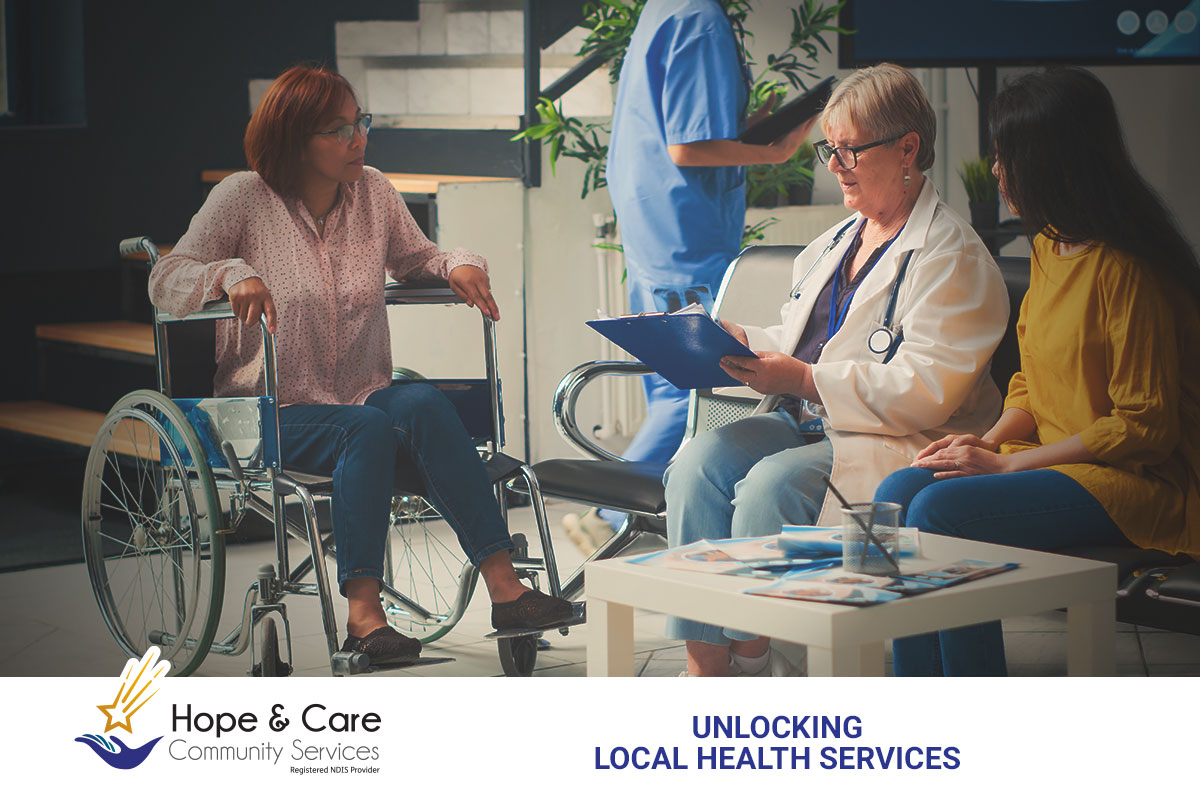
Navigating the National Disability Insurance Scheme (NDIS) can sometimes feel overwhelming. With numerous services available, participants often wonder how to make the most of their NDIS plans, especially when it comes to accessing local health services. This is where NDIS Support Coordination becomes crucial.
At Hope & Care Community Services, we strive to empower individuals with disabilities by helping them unlock the full potential of their NDIS plans. In this article, we will discuss how Support Coordination assists participants in connecting with essential local health services, fostering greater independence, and enhancing their quality of life.
What is NDIS Support Coordination?
NDIS Support Coordination is designed to help participants maximise their NDIS funding. A Support Coordinator works closely with participants to understand their individual needs, goals, and the supports available through their NDIS plan. Furthermore, they act as a guide, ensuring participants have access to the right services, while helping them navigate the often-complex NDIS system.
Support Coordination is available at different levels, ranging from basic to more specialised assistance. Regardless of the level, the main goal is to connect participants to local health services, community supports, and other vital resources, ultimately making their lives easier and more supported.
Why Local Health Services Matter
Accessing local health services is essential for the overall well-being of NDIS participants. These services, such as general practitioners, physiotherapists, occupational therapists, mental health professionals, and other allied health services, play a critical role in maintaining or improving participants’ health and independence.
Moreover, local health services are not just about immediate care—they are often about establishing long-term relationships with healthcare providers who understand the participant’s unique needs. By working with Support Coordinators, participants can effectively bridge the gap between themselves and local healthcare professionals, ensuring they receive timely and appropriate care that positively impacts their quality of life.
How NDIS Support Coordination Connects Participants to Health Services
NDIS Support Coordination plays an important role in facilitating participants’ access to local health services. Below are several key ways it helps:
• Identifying the Right Services:
First and foremost, Support Coordinators collaborate with participants to identify which health services align with their specific goals and needs. They take the time to understand what services are covered under the participant’s NDIS plan and, from there, determine the best local providers to meet those needs.
• Connecting with Health Professionals:
Once the appropriate services are identified, Support Coordinators then assist participants in connecting with healthcare professionals. This might involve scheduling appointments, making necessary referrals, or arranging transport to ensure participants can access the required services without difficulty.
• Navigating the NDIS System:
In addition, understanding how the NDIS system interacts with healthcare services can be challenging for participants. Support Coordinators help simplify this process, explaining which health services are funded under the NDIS and how to use the available funding effectively.
• Advocacy and Support:
Furthermore, Support Coordinators advocate on behalf of participants to ensure they receive the best possible care. This advocacy may involve working with healthcare providers to tailor services to the participant’s specific needs or addressing any concerns that arise throughout the care process.
Empowering Participants Through Local Health Services
By unlocking access to local health services, Support Coordination empowers participants to take control of their health and well-being. Whether it is arranging regular therapy sessions, obtaining mental health support, or managing chronic conditions, connecting participants with the right health services enables them to lead fuller and more independent lives.
Additionally, Support Coordination fosters participants’ confidence and provides ongoing support as they navigate the healthcare system. As a result, participants can focus more on achieving their personal goals, leading to better health outcomes and an enhanced quality of life.
The Role of Allied Health in NDIS Plans
Allied health professionals are key to supporting the diverse needs of NDIS participants. These services address a range of challenges, from physical and psychological to communication-related, helping participants live independently. Some of the most common allied health services accessed through NDIS plans include:
• Physiotherapy:
Helps improve mobility, strength, and physical function for individuals with physical disabilities or chronic conditions.
• Occupational Therapy:
Assists participants in developing or regaining essential life skills, enabling them to perform daily tasks independently.
• Speech Pathology:
Provides therapy for participants facing communication challenges, offering tools to improve speech and understanding.
• Psychology and Counselling:
Offers support for mental health, providing strategies for emotional well-being, stress management, and coping with mental health challenges.
Through NDIS Support Coordination, participants are connected to these crucial allied health services, ensuring their health and independence are consistently supported.
How NDIS Support Coordination Enhances Well-being
The benefits of Support Coordination extend beyond merely connecting participants with health services. By taking a holistic approach to participant care, Support Coordinators empower participants to develop the skills and confidence necessary to manage their healthcare independently. This not only improves their immediate health outcomes but also equips them to advocate for their own needs in the future.
Conclusion: Unlocking Better Health Outcomes with Support Coordination
In conclusion, accessing local health services is a vital part of maintaining a high quality of life for NDIS participants. Through NDIS Support Coordination, individuals can navigate the healthcare system with greater confidence, ensuring they receive the services they need to thrive. By unlocking access to essential health services, participants are empowered to take charge of their health and lead more independent, fulfilling lives.
About Hope & Care Community Services
At Hope & Care Community Services, we are dedicated to helping NDIS participants get the most out of their plans by connecting them with local health services that match their unique needs. Our Support Coordinators work hand-in-hand with each participant, offering personalised guidance and advocacy to ensure they receive the care and support they deserve. Together, we strive to empower individuals to achieve their personal goals and live independently.
Finally, as Registered Provider, we understand the intricacies of the navigating services on your own. Unlock the full potential of your funding and provide the guidance you need to reach your goals. Feel free to Contact Us to explore how we can assist you on your journey. For instance, the NDIS is there to make a positive difference in your life, and we’re here to help!.
Want to learn more? Read other articles :
- Redefine Independence your own way – with HCCS
- Who’s Who: The Key Terms of Your NDIS Plan
- Foundational Supports: Building Blocks of NDIS Success
HCCS is a registered NDIS provider. Learn more about our services.
♥ We are available in Brisbane! – Our team is just a call away!
